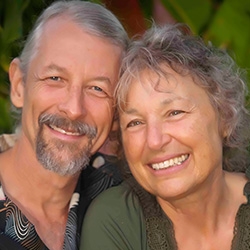

NVC Resources on Vulnerability
-
This explores four types of feedback: destructive, constructive, by demonstration, and dialogue.
-
Why is it so difficult to change our patterns even when we want to, even when we experience shame or despair about them? Arnina Kashtan offers some of the common pitfalls and concrete steps to overcome them in the future.
-
Explore NVC’s core elements alongside universal spiritual principles.
-
Explore NVC as a spiritual practice through dynamic conversations on compassion and transformation.
-
Jori and Jim Manske offer a process they call "The Zero Step," encompassing the characteristics of warmth toward self and other, care for the vitality of both yourself and other(s), wonder/interest, vulnerability and empathy, which leads directly to connection requests and an openness to outcome.
-
How do you know when you’re projecting disowned parts or replaying old relationship dynamics? It’s hard to know for sure, but if you find yourself upset or shutting down and unable to have a dialogue in which you can speak clearly about your feelings and needs and empathize with the other’s feelings and needs, there is likely a projection. The stronger your reaction, the more likely you are projecting.
-
We each hold an internal model or set of expectations about how caring and comfort could be accessed in relationship. The ability to reflect upon and challenge our own dominant model of perceptions, beliefs, and behaviors --and to experience discomfort and vulnerability-- is a key feature of "security". If not, an "attachment reactivity" arises -- where sense of insecurity, separateness, and belief that love, and acceptance can't be trusted nor accessed reliably. Thus change would require intensive support. Here's a guide to help you reflect and access change.
-
Embrace nonviolence with courage and compassion as you learn to stand for truth in everyday life.
-
Develop resilience and stay present amidst challenge by tapping into the living energy of needs.
-
It may be challenging to hear or make requests when you feel shame regarding anyone's feelings and needs. Without support, shame could be debilitating, so you may feel resistant and become defensive, hear threat, or criticize others. Instead, be with people who allow space for vulnerability. Find ways to celebrate, negotiate, be mindful, accepting, and creative.
Quick Links

Stay in Touch!
We value your privacy, won't share your email address and you can easily unsubscribe any time.










